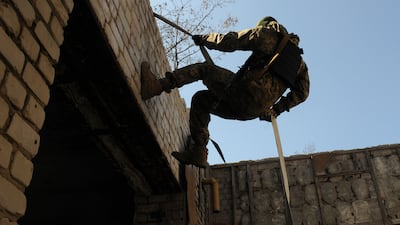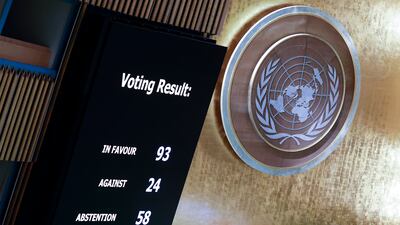Live updates: follow the latest news on Russia-Ukraine
Noam Chomsky has no truck with those who would explain away the brutality of the war in Ukraine, but he does warn that there only two outcomes of the seven-week conflict.
"One possibility is to move on to facilitate the destruction of Ukraine and possibly a nuclear war," Prof Chomsky told The National. "That's one possibility.
"So when you read a headline in a main journal in the United States calling for Russia delenda est (we must destroy Russia), what that is saying is I want to kill everybody in Ukraine and I want to move on to a nuclear war which will end human life on Earth.
"The other possibility is to abandon that stance to move in the direction that [French President] Emmanuel Macron was moving towards in his abortive discussions with [Russian leader Vladimir] Putin."
The phrase "Russia delenda est" is an echo of Cato the Elder's formula that declared Carthage must be destroyed to stop the enemies of Rome and was indeed published in recent weeks in Washington publications.
It is not an irony that it was updated by the Russian author Leo Tolstoy in 1899, in a famous attack on militarism and promotion of pacifism by the writer of the epic War and Peace.

For Prof Chomsky, 93, whose father was born in what is now Ukraine (his mother was born in what is now Belarus), the obvious path forward has been well promoted as an alternative to the Cold War settlement for more than 15 years.
To give Mr Putin the kind of security landscape he seeks for Russia avoids a bleak escalatory pathway with a country that has an enormous nuclear arsenal.
"Now that kind of settlement will be ugly," he said. "That's a fact. It will have to offer President Putin some kind of escape hatch.
"If it doesn't offer an escape hatch then, when the hard men in Moscow have their backs to the wall and are told there's nothing left for you, the only choice for them is to use all their power.
"So the settlement will have to have an escape hatch. And everyone knows pretty much what it is.
"It will have to be a settlement that agrees on the neutralisation of Ukraine and some diplomatic finesse to put aside for the time being the status of Donbas and Crimea to be negotiated at a later stage, and a ceasefire and withdrawal of troops.
"That's basically the framework and it's understood out of all sides."

For one with an enormous following in radical leftist politics, Prof Chomsky evinces great respect for diplomatic expertise.
One scenario is that Ukrainian President Volodymyr Zelenskyy could reach a ceasefire with the Kremlin but Washington would effectively scupper it by refusing to unwind sanctions.
Prof Chomsky has been critical of US President Joe Biden's moral outrage over Ukraine but indifference elsewhere, notably with regards to Afghanistan.
"Washington's position now is to fight to the last Ukrainian," he said. "Not my words, I'm quoting one of the most astute and respected members of the diplomatic service, former ambassador to Saudi Arabia, Chas Freeman.
"He has described in some detail US strategy, and in his words, it's fight to the last Ukraine but don't have a negotiated settlement. Don't offer a way out — that's US policy."

He regards Mr Biden's decision last September to issue a statement on a Strategic Defence Framework for Ukraine, offering advanced weapons, joint exercises and increased training for the Kyiv military, as a potential trigger.
"It could be that this was what finally induced Russia to make the dangerous, criminal decision to go to direct invasion," he said.
Prof Chomsky's analysis renders much of western analysis of how the war has unfolded as being besides the point.
The strategy experts agree that drastic escalation or a scaled-back campaign focused on the south and east are Mr Putin's immediate choices.
The wider findings that Russia crucially underestimated Ukraine's will to resist, misread unity among western countries and even that it now faces disquiet among the sanctioned Russian elite should be set aside.
The paramount factor for Prof Chomsky is the 30-year unravelling of the post Cold War entente.
"There was a great opportunity at the end of the Cold War and President Bush, first President [George] HW Bush, actually pursued it," he says.
"Mikhail Gorbachev had presented a vision of a post Cold War Europe. It would be a unified Eurasia from Lisbon to Vladivostok with no military alliances — what was called common European home.
"President Bush's option was not that different, it was called the 'Partnership for Peace'. The Partnership for Peace didn't exclude Nato but it had a limited relationship to it. So countries could join the Partnership for Peace without a connection to Nato.
"Tajikistan, for example, joined — no Nato connection — and it could have been extended to include Russia in a general partnership for peace in which military alliances would erode and maybe disappear."
The turning point was the policy path pursued by Bill Clinton, who replaced the Republican in 1993. Prof Chomsky sees Mr Clinton as playing both sides by signalling partnership with Moscow, but preparing ground for an expansion of the North Atlantic alliance to the Russia border from the mid-1990s.
"To the Russians he said 'Partnership for Peace'," he said. "To the world he said we're going to expand Nato to the Russian border. He was bitterly condemned by Boris Yeltsin.
"This was in strict violation of a promise, firm commitment, that President Bush had made to Gorbachev that Nato would not extend one inch to the east, meaning to the east of East Germany, and Bush lived up to that."
Worse was to come when George W Bush sought untrammelled Nato growth after the September 11 attacks and the campaign in Afghanistan.
"When George W Bush came in, the second Bush, he threw it open to the wind, invited in a series of other former Russian satellites right to the Russian border," Prof Chomsky said.
"Every American diplomat — George Kennan, Henry Kissinger, heads of the CIA — all of them understood very clearly that Georgia and Ukraine are red lines. The Russians will tolerate a lot but not the entry of a hostile military alliance into their geostrategic heartland."
From the great unravelling to the outbreak of conflict in Georgia in 2008 and in Ukraine in 2014, when Russia secured enclaves of Russian speakers in both countries, the deterioration in understanding with Moscow has been slow but inexorable.
What Prof Chomsky now fears is a literal endgame for all organised humanity.
"One possibility is to move on to facilitate the destruction of Ukraine and possibly a nuclear war," he said.
"It also means strong possibility of moving on to confrontation between major nuclear powers, which is essentially the end."













































